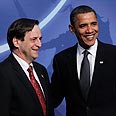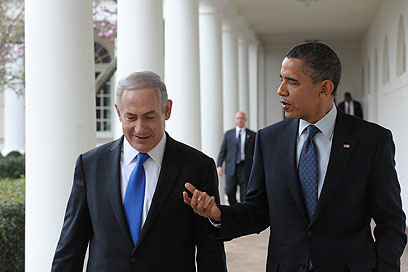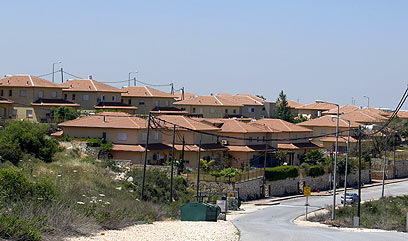
Palestinian officials: Obama must pressure Israel
Top PA negotiator says US president's upcoming visit to region will be successful 'only if he realizes reasons for failure of previous round of talks and avoid them.' Meridor: We could pay a great price
The Palestinians on Thursday responded coolly to a White House announcement that President Barack Obama will not bring any bold new peace initiatives to the region next month, saying there is no hope for reviving serious negotiations unless the US leader is personally involved.
The Palestinians' comments reflected their sense of desperation after four years of deadlocked peace efforts with Israel, and raised the pressure on Obama to extract new concessions from Israeli Prime Minister Benjamin Netanyahu.
Related Stories
- US ambassador to Israel sheds light on Obama visit
- Will presidential visit end 'Obama-Bibi soap opera'?
In a setback for Netanyahu, a close political ally criticized Israel's settlement policies, saying continued construction deep inside the West Bank has undermined Israel's credibility and could threaten the country's long-term survival.
"We could pay a great price," Deputy Prime Minister Dan Meridor, a senior member of Netanyahu's Likud Party, warned on Israeli Radio.
The White House said this week that Obama would make his first presidential visit to Israel and the Palestinian territories this spring, setting off speculation that he was coming to restart peace efforts.
On Wednesday, the White House moved quickly to play down expectations, saying the primary goal of the visit was to repair the strained relationship with Netanyahu, not to present a new diplomatic initiative. Both Obama and Netanyahu are just beginning new terms in office.

Netanyahu, Obama (Photo: Amos Ben-Gershom, GPO)
The Palestinians welcomed news of the visit, but implored Obama to take a more hands-on approach than he did during his first term.
"We believe he has good intentions, but in order for him to succeed, he should realize the reasons for the failure of the previous round of talks and avoid them," said Mohammed Ishtayeh, a senior Palestinian negotiator. "Mainly he needs to get involved personally and put real pressure on Israel."
Video courtesy of jn1.tv
Peace efforts remained frozen throughout Netanyahu's previous term, in large part because of Israeli settlement construction in the West Bank and east Jerusalem. The Palestinians claim both areas, captured by Israel in the 1967 Mideast war, for a future state.
The Palestinians have refused to negotiate while Israel continues to build settlements, saying it is a sign of bad faith. With more than 500,000 Israelis living in the settlements, the Palestinians say hopes for partitioning the land into two separate countries are running out.
The Palestinians say the pre-1967 boundaries must be the basis for the border between Israel and a future Palestine, a position that has been endorsed by Obama and most of the international community. While Netanyahu has endorsed Palestinian statehood, he rejects a return to the 1967 lines and says talks should resume without any preconditions.
Blame game
The Palestinians have blamed Obama in part for the current predicament. When Obama took office in early 2009, he promised to make Mideast peace a top priority and spoke out sharply against settlement construction.
Obama even managed to persuade Israel to impose a temporary slowdown on settlement building. But when the 10-month moratorium expired in late 2010, a new round of peace talks collapsed just weeks after they were launched. Negotiations have remained frozen.

Israeli settlement in West Bank (Archive photo: AFP)
Netanyahu has argued that the Palestinians have negotiated with previous Israeli governments while settlements were being built, and that even when he imposed a slowdown on construction, they waited for months before relaunching the short-lived talks.
But there has been little international sympathy.
In November, the UN General Assembly voted overwhelmingly to recognize a Palestinian state in the 1967 lines. Netanyahu responded by announcing plans to build thousands of new homes in the West Bank and east Jerusalem, drawing harsh condemnations from his allies in the US and Europe.
The Haaretz daily on Thursday, citing two unidentified officials, quoted Netanyahu's national security adviser, Yaakov Amidror, as warning that Israel's settlement policies were hurting its standing with key allies.
"It's impossible to explain the issue of settlement construction anyplace in the world," he was quoted as saying. "Construction in the settlements has become a diplomatic problem and is causing Israel to lose support even among its friends in the West."
Netanyahu's office refused comment. But on the radio, Meridor said the government was sending mixed signals to the world by speaking in favor of Palestinian independence while settling Israelis on lands claimed by the Palestinians.
He said Israel should limit construction to major settlement "blocs" and existing Jewish settlements in east Jerusalem, and halt construction in outlying areas. Israel is expected to keep these settlements under any future peace deal.
"There is a lack of consistency between our claim of wanting two states ... and the fact that we don't limit building to the blocs only," he said. By sending this mixed message, "we cast doubt on our intentions and statements, and this is costing us a very high price."
Meridor stressed that establishment of a Palestinian state is in Israel's interests. Without a partition, most demographers believe that the Arab population under Israeli control could soon outnumber Jews.
The Palestinians have warned this could turn Israel into an "apartheid-style" state with a Jewish minority ruling over a disenfranchised Arab majority. The Arabs would turn their struggle away from independence and instead seek equality in a single mixed state.
A recent report by the anti-settlement watchdog group Peace Now found that nearly 40 percent of settlement construction under Netanyahu took place deep inside the West Bank.
Post-election reality
Netanyahu, who is building a new coalition government following elections last month, has pledged to revive peace efforts in his new term and is courting centrist parties to join him. But he has given no sign that he is planning to soften his key positions on borders and settlement construction.
Ishtayeh said the Palestinians would not budge on their demands for a settlement freeze or their insistence that the 1967 borders remain the baseline for negotiations. He also ruled out an interim agreement while final borders can be worked out.
This could signal tough times ahead for the Obama administration. Newly sworn-in US Secretary of State John Kerry is expected to visit Israel, the Palestinian territories and other countries in the region this month ahead of Obama's trip.
In a separate development, a Gaza man who carried out the longest-ever hunger strike by a Palestinian prisoner returned home.
Akram Rikhawi ended his 103-day hunger strike last July in exchange for Israel's pledged to release him five months earlier than his scheduled release in June.
Rikhawi, 40, who claimed to be suffering from asthma and diabetes, was taken to a hospital. He served a nine-year sentence for transporting suicide bombers.
"I am happy to be back home after this long suffering. It's a victory for prisoners who are fighting with their empty stomachs," he told reporters.
- Receive Ynetnews updates directly to your desktop












